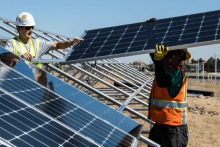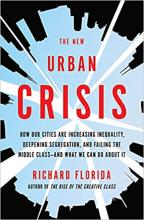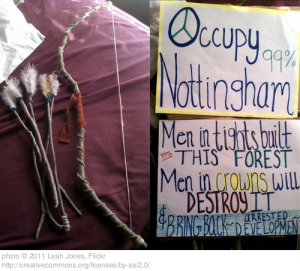infrastructure

FOR SOME REASON, conversations about economics and the church are rare these days — even though scripture includes more than 2,000 verses on poverty, such as laws in the Hebrew Bible on debt, labor, and land ownership. In the gospels, Jesus had many conversations with people about their relationship to money.
Our daily lives wade in the waters of economics, even in the most ordinary ways. When I brushed my teeth this morning, for instance, I used a brand-name electric toothbrush and a brand-name toothpaste, one that claims to be gentle on tooth enamel. After leaving my apartment, I gazed ahead to the street corner, where a man with a familiar face extended his hand in need to passersby. On the streets of New York City, the human cost of economic insecurity is painfully evident. I made my way eastbound toward Park Avenue; the potholes had me pondering how my hood is often overlooked in the city’s infrastructure budget. Yet, somehow, new “affordable” luxury apartments pop up, seemingly out of nowhere; I sometimes wonder if these buildings just appear overnight, ready-made. I’m also reminded that our local community board, through its land use committee, had some say in these new developments.

Most of the U.S. public doesn’t “know anything at all” about congressional Democrats’ Build Back Better infrastructure plan, according to a CBS poll released this week. Even though the provisions the plan contains could help countless families, the language of “infrastructure” is both distant from our daily lives and too obscure to generate a sense of urgency. “My people are destroyed for lack of knowledge,” the prophet Hosea warns (Hosea 4:6). How true that rings now.

The American Jobs Plan invests in rebuilding our economy, creates millions of good-paying jobs, helps workers transition out of the fossil fuel industry, and protects our health, land, air, water, and global climate.

Biden's plans are not just about good politics or good policy — they’re about what government can do to relieve human suffering, about whom government should invest in. These are not just political matters but ethical ones. So let’s look at Biden’s three big plans from a moral, theological, and biblical perspective.

FIFTEEN YEARS AGO, Richard Florida argued in The Rise of the Creative Class that cities fostering brainy interaction, creativity, and innovation would thrive, since modern capitalism was increasingly knowledge-based. His projections were acclaimed by artsy, back-to-the-city types (including many church planters) and scorned by activists and the low-income residents that gentrification displaced.
The critics were on to something, because since then many big cities have indeed gotten sexier, but not necessarily more reliable, especially for the masses. From 2006 to 2014, average incomes declined by 6 percent, while average rent prices soared by 22 percent. Today, about 21 million American renters are putting 30 to 50 percent of their income toward rent, with 30 percent representing the “cost-burdened” threshold.

Catholic Charities is giving out water and food. The Flint Jewish Federation is collecting water and water filters. And the Michigan Muslim Community Council has distributed more than 120,000 bottles of clean water for Flint, Mich. But these faith organizations are also focused on a longer-term goal: to make sure the impoverished city, where President Obama last weekend declared a state of emergency over its poisoned water, is never so neglected again.
ECONOMIC INEQUALITY ISN'T NEW. But this spring it became trendy, especially after Pope Francis dropped the tweet heard ’round the world in April: “Inequality is the root of social evil.”
Around the same time, Capital in the Twenty-First Century—a just-short-of-700-page book by French economist Thomas Piketty—became a best seller. Piketty, while not quite as concise as the pope, also sees wealth inequality as a problem—he focuses on its damaging effects on democratic institutions. Using extensive data, Piketty makes the case that escalating wealth inequality is built into capitalism. Without specific interventions, he writes, our politics and culture will be dominated by a small elite controlling vast amounts of primarily inherited wealth. It might create a new Gilded Age for some, but it won’t be any shinier for regular folks than the first one a century ago.
When class and economic status become news, the conversation tends to get a little shrill. Terms such as “Marxist” and “anti-business” were tossed around freely in reference to both Piketty and the pope. Some, of a more spiritual bent, sought to warn the pope and other Christians who decry inequality about the biblical sin of “covetousness,” offering reminders of the virtue of hard work. (I guess the hidden message of the parable of the rich man and the beggar at his gate is that Lazarus is envious; the real issue must be Lazarus’ poor work ethic and lack of get-up-and-go!)
But the inequality gap should be of concern to everyone, whatever their income or ideology. The point is not the fact that there are differences in wealth—those exist in any human society. And it’s not necessarily helpful or productive to seek scapegoats or assign broad characteristics to particular classes; neither poor people in general nor rich people in general are inherently noble, lazy, or scheming—temptations may vary, but good and evil can be found in people of every economic status.
In a report obtained by the Los Angeles Times, the Energy Department said Thursday that power plants are at risk of being shut down due to the effects of climate change. With the rise of temperatures and sea levels and decreased water resources, the Energy Department advises officials to become more environmentally aware of their natural disaster plans as their ideas could permanently affect the future of Earth's climate. The Los Angeles Times reports:
The report calls on federal, state and local governments to more urgently prepare crucial infrastructure - particularly coal, natural gas and nuclear plants - for the compounded risks posed by floods, storms, wildfires and droughts.
"All of our science goes in one direction: The damages are going to get worse,” Assistant Energy Secretary Jonathan Pershing said. “It will take dozens of actors from government and private sectors planning what to do and how to make it cost-effective.”
Read more here.

With the opening of the G20 Summit in Cannes, France today, an idea that's been around for awhile is in the news again and gaining more attention as a result of the #OWS movement: The so-called "Robin Hood tax," a minimal tax on all financial transactions with the resulting revenue dedicated to anti-poverty programs....Archbishop of Canterbury Rowan Williams, in his response to the occupation of St. Paul's Cathedral in London, endorsed the Vatican proposals. Williams observed that "people are frustrated beyond measure at what they see as the disastrous effects of global capitalism," and urged a full debate on "a Financial Transaction Tax
The Olympics is the greatest representation of national athletic pride. Somehow every couple of years, patriotism is met with a degree of innocence and acceptance that is too often forgotten in conflict and negotiation.
Five years ago, Afghanistan re-entered international basketball when the county's Olympic committee decided to draft a team for the 2006 Asian Games. A year later, the committee hired Mamo Rafiq, who was the first Afghan immigrant to play in the NCAA first for Idaho State and then UC Davis.
Bamiyan is a central Afghan town, home to two monumental Buddha statues carved out of sandstone cliffs. In a zealous attempt to purge anything considered un-Islamic, the Taliban targeted these historic statues a decade ago when they occupied and controlled Afghanistan. The defamation of non-Islamic monuments and sites caused a global response. The efforts of national leaders failed, and the Taliban destroyed the statues in March, 2001. The world community -- from Russia to Malaysia, from Germany to Sri Lanka -- expressed horror at the Buddha's demolition.
Sitting over the Bamiyan Valley since the early sixth century, one of the Buddha figures stood nearly 180 feet tall and the other 120 feet. Before their destruction, these statues were the largest Buddha carvings in the world. They were once a major tourist attraction, but the decades of conflict drove away tourists years before the Taliban blew up the statues.
As the time shortens for Congress and President Obama to agree to the contours of legislation to raise the nation's debt ceiling, I am reminded of the story of King Solomon and his judgment regarding two women who both claimed to be the mother of a child (I Kings 3: 16-28). Solomon ordered that the living child be cut in two and half a dead child be given to both women. The woman who was the true mother insisted that the living child be given to the false mother. She was willing to give up her righteous claim to save the child's life.
It's funny the things that you remember. I can remember one time when I was a teenager watching an episode of the Montel Williams show. I don't remember the topic, but I do remember Montel criticizing the U.S. government for spending too much money on military defense and not enough on domestic needs. I remember thinking to myself, "That's the stupidest thing I've ever heard." In the world that I knew, the idea of slashing military spending was absolutely, totally, utterly UNTHINKABLE! I personally had never met anyone who thought that way, so I assumed that anyone who would suggest such a thing had to be either a) naive; b) stupid; c) a tree-hugger; or d) unAmerican.
That was then.
I don't know if it's because I changed or because America has changed (or both), but for years it seemed like the only ones who suggested slashing military spending were groups that few Americans could identify with: like hippies, pacifists, environmental and civil rights activists, and conspiracy theorists. Today, the idea that a significant portion of the nation's economic woes is due to wasteful Pentagon spending can be found both on the left and on the right ends of the political spectrum. It can also be found in the Pentagon.
Meet "Mr. Y."
House Republicans announced a plan yesterday to cut $43 billion in domestic spend
Before the 2011 State of the Union address, Senator Mitch McConnell (R-KY) said that President Obama would speak about "investments" and that it was Latin for spending. I looked it up. The Latin root for "investment" is in + vesti meaning to clothe or surround. The definition of "invest" according to Dictionary.com is: "to put money to use, by purchase or expenditure, in something offering potential profitable returns, as interest, income or appreciation in value." The difference between an investment and spending is the difference between buying a new pair of shoes and buying stock in the company that makes the shoes. I may enjoy the shoes, but stock in the company will pay dividends long after the shoes are old and gone. The shoes are of little value or benefit to my children, but stock in the company, especially if the company grows and prospers, will benefit them. In his State of the Union address, President Obama spoke about winning the future. In order to do this, the United States ought to attend to innovation and education. We, as a nation, ought to rebuild the country's infrastructure, bring down national debt, reorganize government for more efficiency, and continue our support for the democratic aspirations of people across the globe. All of these will require investments.
